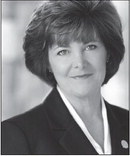Bridging the gap for State’s often underserved mentally ill

Bridging the gap for State’s often underserved mentally ill
Limited access to mental health services can result in substantial costs to all of us. This includes costs to families and the criminal justice system.
Behavioral health includes not only ways of promoting well-being by preventing or intervening in mental illness such as depression or anxiety, but also has as an aim preventing or intervening in substance abuse.
The Affordable Care Act addressed this need by requiring it to be an essential health benefit in private health plans and Medicaid coverage. The ACA also required these policies to allow enrollees the same access to mental health services that they had to physical health services.
A recent national study showed that almost half of adults eligible to receive Medicaid have a behavioral health diagnosis and 18% of this population have a diagnosis of bipolar or major depressive disorder. This week the Department of Human Services updated the Health Reform Legislative Taskforce about the efforts the agency is making to ensure Arkansans covered under Medicaid are receiving the best possible treatment when it comes to behavioral health.
DHS is finalizing a proposal to transform the rehabilitative services for persons with mental illness into an evidence based and best-practice benefit. This will include independent assessments and services tailored to specific populations. It also includes creating individual plans of care and levels of services tied to the level of severity. In addition, their proposal will provide coordination for inpatient admissions and provide wrap around services for children in foster care.
The American Academy of Pediatrics identifies mental and behavioral health as the “greatest unmet heath need for children and teens in foster care.” 80 percent of children in foster care have a mental health diagnosis.
DHS will begin the process of accepting bids from health care providers this fall. The agency anticipates to begin implementation next summer.
Arkansas has more than 283,000 people receiving coverage on the Private Option (soon to be Arkansas Works) and more than 634,000 residents are receiving traditional Medicaid.
This means almost a third of our population relies on the services provided state and federal dollars. As legislators we are reviewing the changes proposed by DHS not only to ensure those residents have access to quality coverage but also to ensure we are providing those services as efficiently as possible.

From State Representative Deborah Ferguson


Share